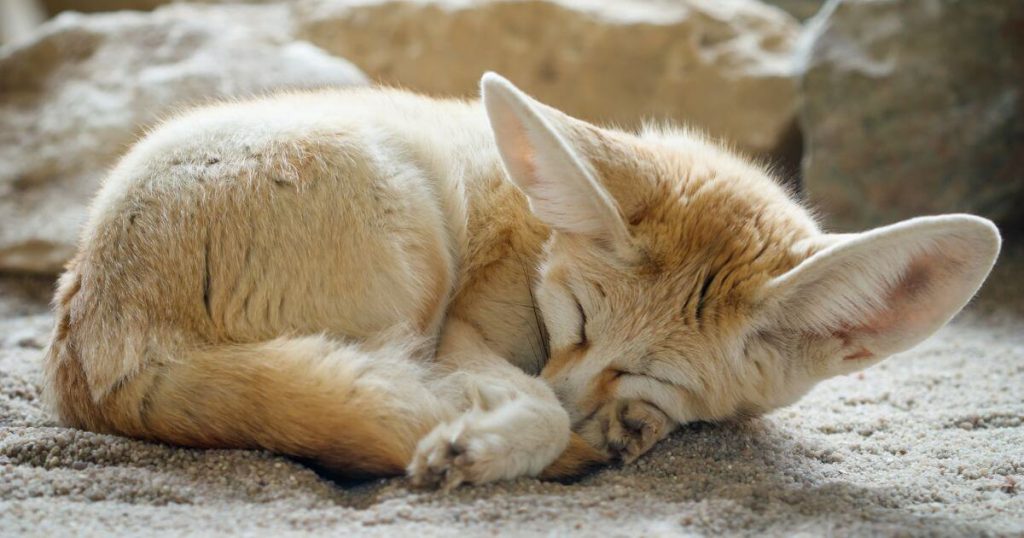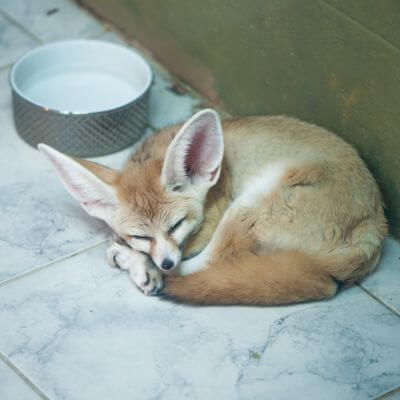
Quick Intro to the Fennec Fox
Despite their small size, fennec foxes are full of personality. They are more than just cute faces; they are survivors, adapted to thrive in one of the harshest environments on Earth. Before considering a fennec fox as a pet, it’s essential to understand their unique nature and needs.
Where are Fennec Foxes from?
Ever wonder where fennec foxes come from? They’re native to the Sahara Desert and other hot spots in North Africa. Their big ears aren’t just cute; they’re perfect for living in the desert.
Why are they popular?
These little guys are becoming a big deal in the pet world. They’re not your typical pet, but their playful nature and unique looks are winning hearts.
Should You Own a Fennec Fox?
So, you’re thinking about getting a fennec fox? That’s a big step! Let’s talk about what it really means to have one as a pet.
Is it legal to own a Fennec Fox?
Guess what? Where you live plays a big part in whether you can have a fennec fox. In the US, rules vary a lot. Some places say no way, others just need you to get a permit. And hey, sometimes local rules are different from state rules. Always good to check!
Ethics
When you’re getting a fennec fox, make sure it’s from a good place. We’re talking reputable breeders or rescue groups. It’s pretty rare to find wild-caught ones, but you want to be sure yours is bred for a pet life.
Things to Consider
Fennec foxes are super cute, sure, but they’re also noisy and full of energy. If you decide to bring one home, you’ve got to be ready for the work. They need the right exercise, food, and vet care. It’s all about making sure they’re as happy and healthy as can be!
| Common Names: | Fennec fox, desert fox |
| Scientific Name: | Vulpes zerda |
| Adult Size: | Typically 9 to 16 inches in body length, with ears up to 6 inches long; weighs between 1.5 to 3.5 pounds |
| Lifespan: | Can live up to 11 years in captivity, sometimes longer with exceptional care |
| Distinguishing Features: | Notable for their oversized ears; their coat is long, soft, and sandy-colored, helping them blend into desert surroundings |
| Native Habitat: | Primarily found in the Sahara Desert and other North African deserts |
| Diet: | Omnivorous, primarily eating insects, small mammals, birds, eggs, and various plant material |
Physical Characteristics of Fennec Foxes
Size and Appearance
Fennec foxes are like the pocket-sized versions of the wild canine family. They’re small enough to fit in a tote bag, measuring just about 9 to 16 inches long. But don’t let their size fool you; they weigh a light 1.5 to 3.5 pounds, almost like a small bag of flour.
Unique Features
The first thing you’ll notice about them? Their enormous ears! These aren’t just for show; they help the foxes stay cool in the desert heat. And their fur, it’s like a coat of sandy gold, perfect for blending into their desert home. Plus, their fur-covered paws? They’re like natural sandals, protecting their feet from the hot sand. It’s all about staying cool and stealthy in the desert. Beyond their size and distinctive ears, fennec foxes have a coat that reflects the desert’s colors. Their fur not only helps them blend in but also provides insulation against the extreme temperatures of their natural habitat.






Behavior and Social Traits of the Fennec Fox
Social Behavior in the Wild and Domestic Settings
In the wild, fennec foxes are quite the team players. They live in small communities, which is pretty rare for foxes. At home, they’re friendly and social too, but remember, they’re still wild at heart. While fennec foxes in the wild are accustomed to the company of their kind, in domestic settings, they often form a deep bond with their human families. However, their natural instincts, such as their burrowing and hunting behaviors, remain strong.
Comparison with Other Pets
Compared to typical pets like cats or dogs, fennec foxes are a whole different ball game. Even your average gecko might seem more low-key than these little dynamos.
Nocturnal Nature and Activity Patterns
Fennec foxes are night owls, literally. They’re most active when we’re hitting the hay. This means you might hear some late-night rustling and bustling.
Communication: Vocalizations and Body Language
These furry friends are chatty in their own way, using a mix of sounds and body signals. From little barks to excited sprints, they’ve got their unique way of expressing themselves.
Fennec Fox Pet Temperament
Temperament in Domestic Settings
At home, Fennec foxes bring a mix of wild spirit and playfulness. They’re curious and energetic, but remember, they’re not your typical domesticated pet. They need understanding and patience. Fennec foxes often display a dual nature at home. They can be shy and reserved, especially around strangers or in unfamiliar environments. It’s crucial to slowly and gently introduce them to new people and situations. Their playful side often emerges once they’re comfortable, showcasing their curious and adventurous spirit.
Interaction with Humans and Other Animals
These desert foxes can bond with humans, showing affection and playfulness. But, they’re a bit of a wildcard with other pets. It’s all about the right introduction and socialization.
Health and Lifespan
Average Lifespan
In the cozy confines of a home, these little foxes can live up to 11 years or more, with the right care.
Common Health Issues and Preventive Care
Just like any pet, they have their health needs. Regular vet visits and keeping an eye out for signs of illness are key.
Besides their general health, fennec foxes in captivity may face specific issues like dental problems due to a diet different from their wild counterparts. Ensuring a balanced diet that mimics their natural food sources as closely as possible is key. Regular dental check-ups can prevent common issues.
Dietary Needs
Omnivorous Diet: Wild vs. Captivity
In the wild, they’re not picky eaters. They’ll munch on insects, plants, and small animals. At home, their diet shifts to a balanced mix of meat and veggies.
Nutritional Requirements and Feeding Schedules
Consistency is key. Regular feeding schedules and the right mix of nutrients will keep your fennec fox happy and healthy.
Housing and Environmental Needs
Adaptations to Desert Life
Fennec foxes are built for the desert. They’re used to extreme temperatures and sandy terrain. But in a home, they need a different kind of environment.
Indoor Housing Requirements and Setup
Inside, they need space with some of the comforts of the desert. Think warm, cozy, and safe. A place they can call their own.
For indoor housing, consider an environment that offers both open spaces and hiding spots. Fennecs enjoy climbing, so safe vertical spaces can provide additional enrichment. Temperature control is crucial; their native desert habitat means they are used to warmer climates.
Importance of Outdoor Enclosures
Outdoor playtime is crucial. They love to dig and explore, so an outdoor enclosure is perfect for exercise and mental stimulation.
Legal Considerations and Ownership Laws
Variations in Legality
Owning a fennec fox isn’t the same everywhere. Some places have strict rules, while others are more relaxed. It’s vital to thoroughly research not only state laws but also local ordinances. Sometimes, the regulations can vary even within different counties or cities within the same state. Consulting with wildlife authorities or legal experts can provide clarity. Always check local laws.
Necessary Permits and Legal Requirements
In some areas, you might need a permit. It’s all about making sure these foxes are in safe, legal hands.
Vet Care for Exotic Pet Fennec Foxes
Routine Health Check-Ups
Regular vet visits are a must to keep your fennec fox healthy.
Specialized Veterinary Requirements
Finding a vet experienced with fennecs is crucial, as they require specific care. Their vaccinations, parasite control, and general health monitoring differ from those of common pets. It’s advisable to establish a relationship with a vet even before bringing a fennec fox home.
How to Buy a Pet Fox
Considerations When Purchasing a Fennec Fox
When you’re ready to buy, think about where your fox is coming from. Is it a good, ethical source?
Ethical and Responsible Sources
Aim for reputable breeders or rescue centers. Knowing your fox’s background is crucial for its health and happiness. Be wary of sellers who are unable or unwilling to provide detailed information about the animal’s origin, health history, and temperament. Trustworthy breeders and rescue centers should be transparent and willing to offer ongoing support
Similar Pets to Fennec Fox
Alternatives to Fennec Foxes
Considering other pets? There are critters like sugar gliders or small parrots that also offer unique companionship.
Comparing Care Needs
Each exotic pet has its unique needs. Comparing these can help you decide what’s right for you. At the same time, researching similar pets helps in understanding the unique needs of fennec foxes. For example, comparing them with other small mammals like hedgehogs or ferrets can highlight the specific environmental, dietary, and social needs of fennecs.
How to Care for Your Pet Fennec Fox
Exercise Needs and Activities
Fennec foxes need their playtime. Think toys, space, and some digging fun. Apart from their physical needs, fennec foxes require mental stimulation. This can include interactive toys, puzzle feeders, and regular, supervised playtime outside their enclosure. Such activities help prevent boredom and promote their physical and mental well-being.
Grooming and Hygiene
They’re pretty low-maintenance, but a clean, safe space is key.
Cost of Owning a Fennec Fox
Initial Costs
Getting started isn’t cheap. You’ve got the fox, the home setup, and more. Prospective owners should budget for potential emergencies and unexpected health issues, as well as routine health maintenance and dietary needs.
Ongoing Costs
Regular costs include food, vet visits, and upkeep.
Challenges and Considerations for Fennec Fox Pet Potential Owners
Territorial Behavior
These foxes can be territorial, a big consideration if you have other pets. Understanding the full spectrum of fennec fox behavior is crucial. For example, their natural digging and burrowing behavior can be challenging to manage indoors. Prospective owners should be prepared for the reality of accommodating such natural behaviors.
Commitment Required
Owning a fennec fox is a long-term commitment, in time and resources.
Last Thoughts
For Prospective Owners
Think it through. Owning a fennec fox is rewarding, but it’s a big responsibility. Ultimately, it is a commitment that spans years and requires a deep understanding of their nature. While they can be delightful companions, they are not suitable for everyone. Thorough research and preparation are key to a successful and fulfilling experience with a fennec fox.
Encouragement to Research
Do your homework, understand what it takes, and then decide if a fennec fox is right for you.
Beginner Guide to Raising Quail at Home
What are the Signs of a Dog Concussion?
What Causes Your Dog’s Ears to Smell Bad?
When your dog’s ears start to emit an unpleasant odor, it might leave you puzzled…
Methimazole Treatment for Cat Hyperthyroidism
Methimazole plays a crucial role in managing feline hyperthyroidism, a condition marked by an overactive…
Got Hummingbirds in your Backyard? Here’s How to Care for Them.
Why Does Your Cat Pee Outside the Litter Box?
Cat’s Litter Box Issues It’s not uncommon for cat owners to face the frustrating dilemma…




